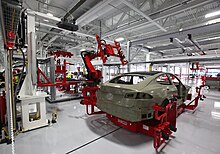
| Part of a series of articles on |
| Machine industry |
|---|
 |
| Manufacturing methods |
| Industrial technologies |
| Information and communication |
| Process control |
Manufacturing is the creation or production of goods with the help of equipment, labor, machines, tools, and chemical or biological processing or formulation. It is the essence of the secondary sector of the economy.[1][unreliable source?] The term may refer to a range of human activity, from handicraft to high-tech, but it is most commonly applied to industrial design, in which raw materials from the primary sector are transformed into finished goods on a large scale. Such goods may be sold to other manufacturers for the production of other more complex products (such as aircraft, household appliances, furniture, sports equipment or automobiles), or distributed via the tertiary industry to end users and consumers (usually through wholesalers, who in turn sell to retailers, who then sell them to individual customers).
Manufacturing engineering is the field of engineering that designs and optimizes the manufacturing process, or the steps through which raw materials are transformed into a final product. The manufacturing process begins with the product design, and materials specification. These materials are then modified through manufacturing to become the desired product.
Contemporary manufacturing encompasses all intermediary stages involved in producing and integrating components of a product. Some industries, such as semiconductor and steel manufacturers, use the term fabrication instead.[2]
The manufacturing sector is closely connected with the engineering and industrial design industries.
- ^ Kenton, Will. "Manufacturing". Investopedia. Archived from the original on November 17, 2020. Retrieved January 16, 2021.
- ^ Thadani, Akhil; Allen, Gregory C. (May 30, 2023). "Mapping the Semiconductor Supply Chain: The Critical Role of the Indo-Pacific Region". CSIS.